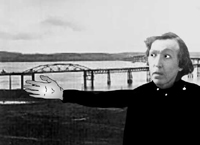
The Railway Bridge of the Silvery Tay
Click here to see the animated version of this poem.
Another tragic victim of McGonagall's compulsive eulogizing was the Tay Bridge, which was for a short time the world's longest bridge. Less than two years after its completion, the bridge collapsed, killing seventy-five passengers. McGonagall celebrates the bridge's opening as an aesthetic accomplishment that will attract people from everywhere, chanting "Beautiful Railway Bridge of the Silvery Tay!" in the first line of each stanza.
But in the sixth stanza, "beautiful" takes on rather ironic connotations, for McGonagall draws attention to the fragility of the bridge in what was to become an unfortunate prophesy:
Of course, McGonagall, like many Dundonians, was fully aware of the bridge's frailty, since its central girders had already been blown down once by high winds during construction. This is probably the reason McGonagall's eye moves immediately in the first stanza to the central girders which appear "towering to the sky," a boast that might have worried some prospective passengers.
McGonagall's incompetent attempt to praise bridge also casts those responsible for building it in a suspicious light. Provost Cox, as head of the largest jute industry in the world, stood to gain directly from greater access to southern markets. The naive McGonagall wishes "prosperity" to both Cox and his builders and commends the former's generosity, yet the poet's seemingly careless wording makes the deal sound like patronage by emphasizing the size of the donation--"Thirty thousand pounds and upwards" ("most handsome to be seen")--and the fact that it was "given away".